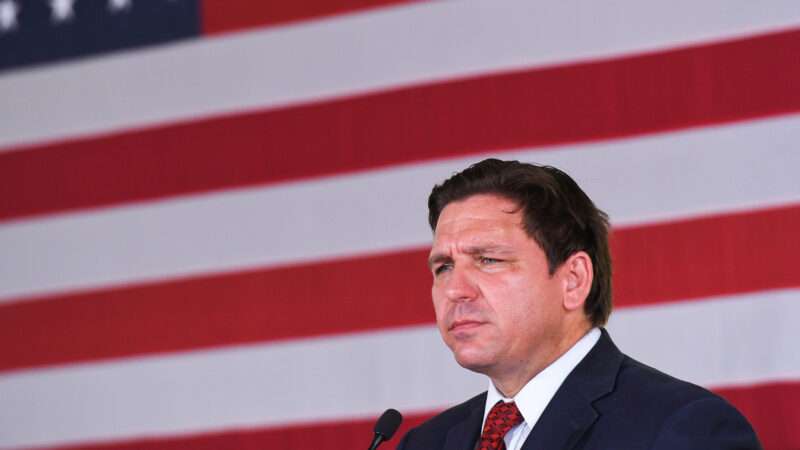
Enes Kanter Freedom knows firsthand how important it is that citizens be allowed to criticize their governments.
Born in Zurich, the basketball player spent most of his young life in Turkey—a place to which he can no longer safely return. Freedom, who now lives in the U.S. and has played for a decade in the NBA, made a name for himself as an outspoken critic of President Recep Tayyip Erdogan’s government. His family has been targeted for retribution, and Freedom can no longer safely contact them. But he hasn’t slowed his roll, choosing to criticize the basketball world’s close ties with the Chinese Communist Party, which carries out some of today’s most heinous atrocities: interning Uyghur ethnic minorities in prison camps, stripping Hong Kongers of their most fundamental civil liberties, surveilling political dissidents, and censoring speech. But China is filled with basketball fans who give the NBA a lot of money—and full of factories, possibly even those using forced Uyghur labor, where athletic companies like Nike produce their shoes.
When Freedom was growing up in Van and Ankara, it was a tough sell getting his family to support his basketball dreams. “I want you to be a good student before being a good basketball player,” his dad told him. His dad, a scientist, and his mom, a nurse, were all about education. “They wanted me to go to school, then focus on nothing else, just studying all day—until I made my first check. After that, they’re like, ‘OK. You’re playing basketball from now on.'” He moved to the U.S. in 2009 to attend a California prep school for one year before signing with the University of Kentucky, where he studied for a short time before the Utah Jazz drafted him in 2011.
Since then, Freedom has also played for the Oklahoma City Thunder, the New York Knicks, the Portland Trail Blazers, and the Boston Celtics. In February, the Celtics traded Freedom to the Houston Rockets. The Rockets waived him, releasing Freedom before his contract was over. Freedom claims this was due to his outspoken criticism of the Chinese government, something NBA Commissioner Adam Silver has denied.
During his time in the NBA, Freedom has feuded with players like LeBron James, criticizing him for his “money over morals” attitude—in Freedom’s words—and James’ reluctance to criticize the NBA’s relationship with China. “Sad & disgusting how these athletes pretend they care about social justice,” tweeted Freedom last year. “They really do ‘shut up & dribble’ when Big Boss [Chinese flag emoji] says so,” he continued. “Did you educate yourself about the slave labor that made your shoes or is that not part of your research?”
Freedom says he got little pushback from the NBA when he was speaking out about the Turkish government’s atrocities. But his commentary on China has drawn the ire of both NBA higher-ups and star players.
In June, Reason‘s Noor Greene spoke with Freedom about his new last name, his antagonism toward companies and players who cozy up to China, and the Turkish government’s enmity toward free speech.
Reason: You said in one of your interviews the name Freedom was inspired by a visit that you made to the U.S. in 2009.
Freedom: In 2009, I was going to prep school for the first time. We had a really tough practice. After the practice, we were all sitting around in the locker room checking our phones. Back then, we all had Facebook. So I saw one of my teammates criticize the president and was very scared for him. I was like, “Dude, what are you doing?”
He’s like, “What happened?” I was like, “I saw your post.” And he’s like, “OK.” And I was like, “Well, you might be in jail tomorrow.” He started to laugh and he was like, “This is not Turkey. This is America.”
He started to explain to me about freedom of speech, religion, expression, protest. I still didn’t get it. If you did that in Turkey, you’d be in jail the next day, so I was very confused. People explained to me: You are not going to be thrown in jail, your family won’t be tortured just because you talk about some of the problems that are happening in America.
I was like, “Wow, this is so beautiful.” I think after water and food, freedom is the most important thing human beings can have. So I was like, “I want to make this part of me. I want to make that word part of me and inspire millions of kids out there.”
So you changed your name. Do you get an option during your U.S. citizenship process to change your name?
They showed me a paper and they were like, “Would you like to change your name? Would you want to add another name?” so I was like, “Yeah, I do,” and I made Freedom my last name.
You became a U.S. citizen in November. But you had a problem in the past with your application. Why was it so hard for you to become a U.S. citizen?
I started to talk about some of the problems in Turkey. Back in 2013, there was a big corruption scandal. President Erdogan and some of his family members were involved in it. After that scandal, he started to go around putting innocent people in jail—prosecutors, lawyers, judges, and police and some innocent people. After that, he started to shut down media outlets, magazines, newspapers, TV channels. I was like, “This is unacceptable, and I’m going to say something about it.”
I literally put a tweet out there. Because of the NBA platform, it became a conversation. I was like, “Wow, even one single tweet can affect this much. From now on, I’m going to start to pay attention about what’s going on in my country more and more.”
I started to study about what’s going on in my country, in America, the relationship between America and Turkey, the things that are happening in the Middle East. I started to talk more.
Because of the NBA platform, many media outlets wanted me to interview and write op-eds for them. The things I talked about really bothered the Turkish government and affected me and my family. My dad got fired from his job. My sister went to medical school for six years; until this day, she still cannot find a job.
The saddest one was my little brother. He wanted to be an NBA player like his big brother, but he was getting kicked out of every team. He was telling me, “I’m the tallest one in my team” or “I’m the best player in our team. Why am I getting kicked out?”
They were getting affected so much, they had to put a statement out there saying, “We are disowning Enes.” I remember going to practice that day. It was definitely one of the toughest days of my life.
The Turkish government didn’t believe that. They sent police to my [parents’] house in Turkey and raided the whole house. They took electronics away because they wanted to see if I was still in contact with my family. Phones, computers, laptops, iPads—they took all of them. They couldn’t find evidence, but they still took my dad to jail for a while. But we put so much pressure from here, with politicians and media, that they had to let him go.
After that, they revoked my passport and put my name on the Interpol list. I still count as an international criminal. I didn’t have any passport and I wasn’t an American citizen; I just had a green card. So that’s why, because my name was on the Interpol list, I couldn’t really travel anywhere outside of America. I had to wait five, six years to become a citizen.
How is your family back in Turkey?
Well, because my dad was in jail, they’re really scared. Because [the Turkish government] listens to everything—all the phones, they track down phones, I.P. numbers, and they try to see if there’s still contact with me or not—if there is any communication, they’ll all be in jail.
The last time I saw my family, it was back in 2015. But my brother plays basketball in Poland, so I ask him, “How’s my family doing? How’s my mom? How’s my dad?” He sends me pictures sometimes of them and stuff, so that’s the situation.
Do you remember the last time you talked to them?
To be honest, I can’t even remember. It’s been that long.
You are passionate about human rights and civil liberties. You focused for a while on the Uyghur issue in China. How did that come about?
Last summer, I was at a basketball camp in New York. After the basketball camp, all the kids and parents were lined up, getting pictures and autographs one by one. I took a picture with this kid.
While I was taking a picture, his parent called me out in front of everybody and said, “How can you call yourself a human rights activist when your Muslim brothers and sisters are getting tortured and raped every day in concentration camps in China?”
I was just shocked. I took a picture, I turned around, and I was like, “I promise I’m going to get back to you.” I canceled everything that day. I went back to my hotel and I started to study about what’s going on, not just Uyghurs. I started with Uyghurs.
First of all, I was like, “I cannot believe that I have not or no one has said anything about this issue before.” I called my manager. I was like, “I need you to find me a concentration camp survivor.” He was like, “What are you talking about?” Because on the internet, you can find all news—good news, bad news, fake news. You don’t know which one is true. So he found me one. Actually, the woman that he found [Tursunay Ziyawudun], you just interviewed.
So I sit down on a Zoom and start to have a conversation with her. She was telling me about all the tortures, gang rapes, forced sterilization, abortion, and how many people were actually inside, the numbers, and how many people are getting killed inside, how are they brainwashed. She told me about organ harvesting and surveillance cameras.
If a human being carries a heart, you have to talk about it. It doesn’t matter what it costs.
At the end of our conversation, I asked her, “OK, what can I do for you?” She said, “Nothing.” I was like, “What do you mean ‘nothing’?” She said, “Well, I’m in America. I’m here. I’m safe. But there are millions of people in concentration camps right now, waiting for your help. Help those people, not me.” I was like, “Whoa.”
While I was studying Uyghurs, obviously other links popped up. I clicked on it. It was about Tibet. I was always hearing about Taiwan on the news, and Hong Kong. I hear about Mongolia.
So I was like, “You know what? These are the biggest human rights abuses in the world today and I’m going to say something about it.” It was the perfect time because it was right before the [Beijing] Winter Olympics.
What was the most controversial tweet you put out there?
The most attention that I had was about Nike, because it was the first time ever that a player called what Nike—the biggest sponsor of the NBA—is doing modern-day slavery. They stand up for Black Lives Matter in America, the Latino community, no Asian hate, LGBTQ community. But when it comes to China, they remain silent. And I was like, “We have to expose this.”
When I was a kid, whenever I watched an NBA game, the first thing that I was watching was the shoes. What color? What brand? Then I was going out there and buying it.
So I wanted to do it in a very unique way where I could put all these abuses on a shoe and go out there and play. There’s no rule against it in the NBA. A lot of people were putting Black Lives Matter, Breonna Taylor, “I can’t breathe,” and all these phrases, so I was like, there’s no rule against it.
So we worked with this artist who had been oppressed by his government and he created the shoes. Free Tibet, Free Uyghurs, stop organ harvesting and surveillance camps. It was getting so much attention. I remember my first game. It was on ESPN, Madison Square Garden. The whole world was watching that game. I put the shoes on, I went out there, and I started to warm up and all the players were looking at my shoes. They’re like, “This is very interesting. I’ve never seen this color,” because it was so colorful and there was a flag on it and it was saying, “Free Tibet.”
Right before the game, we sang the national anthem, we came in a huddle, and two gentlemen from the Celtics came to me and said, “You have to take your shoes off.” I’m like, “What are you talking about?” He said, “Your shoes have been getting so much attention. We’ve been getting so many calls. You have to take your shoes off.”
I was like, “I cannot believe they’re telling me to take my shoes off.” It was a perfect moment because I was just getting ready for my citizenship test. I closed my eyes. I was, “OK. There are 27 amendments: First Amendment, freedom of speech.” I was like: “No, I’m not taking my shoes off. I don’t care if I get fined.”
They said, “We are not talking about a fine. We’re talking about getting banned.” Literally they were threatening me with getting banned just because I was wearing those shoes.
At halftime, I went back to my locker room. I had thousands of notifications on my phone. I clicked on my manager’s text message. He said, “Every Celtics game is banned in China for the rest of the year.” I was like, “That shows my point.”
There’s 24 minutes in one half. It took China 24 minutes to ban every Celtics game on television. That’s literally the censorship and dictatorship that I was talking about.
After the game, obviously there was a huge media storm and I told my manager, “I’m not going to do any media,” because I didn’t want my teammates to think I’m doing this for attention. For the next one or two months, we did not do any media.
After the game, I was getting calls from the NBA and the players association. They told me, “Take your shoes off. You’re not going to wear this ever again.”
I talked about the problems that were happening in Turkey for the last 10 years, and I did not get one phone call. I talked about the things that happened in China, and my phone was ringing once every hour, me and my manager’s.
They were harassing us so much that I was like, “OK, I promise you I’m not going to wear Free Tibet shoes ever again.” So the next game, I wear Free Uyghur shoes. They call me after the game. They’re like, “You’re a liar. You lied to us. You said you’re never going to wear Free Tibet shoes.” I was like, “I did not wear Free Tibet shoes. I wore Free Uyghur shoes.” At that point, they understood that they’re not going to handle me because they’re not going to make me apologize or take my tweet down. They’re not going to make me say, “Oh, I didn’t know enough. I was not educated enough.” I was like, “I’m going all in.”
I wore Winnie the Pooh shoes. Winnie the Pooh is banned in China. People were making fun of the president, Xi Jinping—they were telling him, “You look like Winnie the Pooh.” So he literally banned the whole cartoon in the whole country.
And then the next one we talk about Nike. And the next one, we talk about Hong Kong and Taiwan and stop organ harvesting. Everyone was asking me, “Where can I buy these shoes?” I was like, “I’m not going to even sell them because I’m literally doing this just for human rights.”
You mentioned earlier that you were concerned that some people might view this as a bid for attention. Was there any indication to you that some people thought that?
I didn’t want to put the shoes out there for sale or anything like that, because I didn’t want anyone to think that I’m doing this for attention, especially my teammates. I was talking about very uncomfortable situations that the NBA never wanted to talk about.
I remember my teammates were coming to me one by one in the locker room and saying, “You know this is your last year, right? You are not going to be able to get any contract after this.” They were telling me, “Listen. You attack Nike, you attack China, you won’t play another minute in this league ever again.”
I was like, “Well, this is the right thing to do. I’m just going to continue to keep doing what I’m doing.”
Was there any truth to what they were telling you?
Of course. Obviously, the NBA’s not going to come out there and say, “We released him because of that.” In February, I got traded to not just any team, but the Houston Rockets. The Houston Rockets was the first time that a general manager tweeted something about Hong Kong. Then he had to pull his tweet down and apologize.
Houston Rockets was China’s team because of [former NBA player] Yao Ming. It was the first team that went to China and played a friendly game, I believe it was against the Lakers.
When was the last time you played?
February.
Where are you with the NBA now?
Good question. Obviously, before everything, I’m a basketball player. I am very thankful for the NBA for giving me this huge platform worldwide. But if they’re going to do something wrong, I’m going to expose them.
Where am I with the NBA right now? I don’t even know. I’m just waiting to hear from them. And I told every team, I told my agent to tell every general manager in the NBA, every owner, every coach, “I’m ready to play. I want to play.”
Obviously playing basketball is very important to you. Do you have any regrets?
I played 11 years in this league and I want to continue to play. I’m healthy. I’m 30. I can play.
But this is bigger than basketball, this is bigger than myself, and this is bigger than the NBA. While we are dribbling a ball on the other side of the ocean, people are losing their loved ones, losing their lives, and losing their hopes. How can anyone tell me to stop talking about the problems that are happening around the world and just focus on your game?
I’m coming from a country where if you say anything against the government, you’ll be in jail the next day. If you say you don’t like the president, your family might be tortured. My manager’s wife’s dad liked one of my posts on Twitter; he was in jail for 13 days. So I have seen the pain. I experienced it firsthand. So no one should tell me to just stop talking about all the problems and focus on your game. This is bigger than basketball and I have no regrets.
This interview has been condensed and edited for style and clarity.
The post Enes Kanter Freedom on China and Free Speech: 'This Is Bigger Than Basketball' appeared first on Reason.com.
from Latest https://ift.tt/zuv9gLE
via IFTTT








